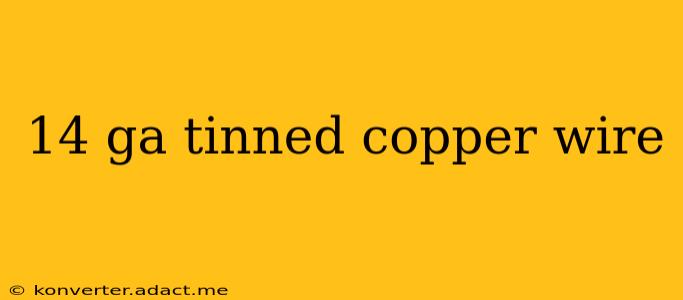14 gauge tinned copper wire is a common type of electrical wire used in a variety of applications. Understanding its properties and applications is crucial for both professionals and DIY enthusiasts. This guide will delve into the specifics of this wire, answering common questions and providing valuable insights.
What is 14 Gauge Tinned Copper Wire?
14 gauge tinned copper wire consists of a copper core coated with a layer of tin. The copper provides excellent conductivity, while the tin coating offers several key advantages: it protects the copper from oxidation and corrosion, enhancing its longevity and reliability. The gauge, 14, refers to the wire's diameter—a smaller gauge number indicates a thicker wire with higher current-carrying capacity.
What are the Advantages of Using 14 Gauge Tinned Copper Wire?
The tinned coating offers significant advantages over bare copper wire:
- Corrosion Resistance: Tin prevents oxidation, a major issue with bare copper, especially in damp or humid environments. This extends the wire's lifespan and ensures consistent conductivity.
- Improved Solderability: The tin coating makes soldering easier and more reliable, crucial in electrical connections. It creates a cleaner and more consistent solder joint.
- Increased Durability: The protective tin layer helps resist abrasion and damage during installation and use.
The thicker 14 gauge also provides benefits:
- Higher Current Capacity: Compared to smaller gauge wires, 14 gauge can handle higher currents without overheating, making it suitable for more demanding applications.
- Reduced Voltage Drop: Thicker wires reduce voltage drop over longer distances, ensuring consistent power delivery to connected devices.
What are the Applications of 14 Gauge Tinned Copper Wire?
This versatile wire finds use in numerous applications, including:
- Household Wiring: While not typically used for main power lines, it's frequently employed in branch circuits for appliances and lighting.
- Automotive Wiring: It's common in automotive electrical systems due to its durability and resistance to vibration.
- Electronics: In certain electronic projects requiring higher current capacity and reliable connections.
- Grounding: Provides a reliable grounding path for electrical equipment.
What is the Difference Between Tinned and Untinned Copper Wire?
The primary difference lies in the protective tin coating. Untinned copper wire is more susceptible to oxidation and corrosion, leading to reduced conductivity and potential failure over time. Tinned copper offers superior durability and longevity, particularly in demanding environments.
How Much Current Can 14 Gauge Tinned Copper Wire Handle?
The current-carrying capacity of 14 gauge wire depends on several factors, including insulation type, ambient temperature, and installation method. However, it generally has a higher ampacity (current-carrying capacity) than smaller gauges. Always consult relevant electrical codes and standards for precise current limits in your specific application.
Is 14 Gauge Wire Suitable for Outdoor Use?
While 14 gauge tinned copper wire offers some protection against corrosion, it's crucial to use outdoor-rated wire for outdoor installations. Outdoor-rated wire has additional protection against the elements, ensuring reliable performance in harsh conditions. Improper wire selection can lead to safety hazards.
How to Choose the Right Gauge of Wire?
Selecting the appropriate wire gauge involves considering the required current, voltage, and length of the wire run. Using a wire gauge calculator or consulting with an electrician can help ensure you choose the right gauge for your specific needs. Undersized wire can overheat and pose a fire hazard, while oversized wire is unnecessary and adds to cost.
This comprehensive guide provides a strong foundation for understanding 14 gauge tinned copper wire. Remember to always prioritize safety and consult relevant electrical codes and standards when working with electrical wiring. If unsure about any aspect of your project, seeking advice from a qualified electrician is always recommended.
